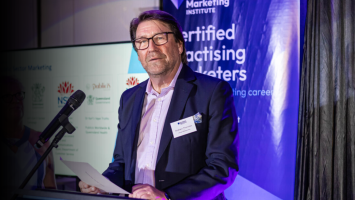‘Better than any form of cold advertising on a social media platform’: Why rainboots maker Merry People is dancing to an affiliate marketing tune

What you need to know:
- Australian rainboots maker Merry People has seen partnership revenue globally double in the last 12 months off the back of an increasingly sophisticated affiliate marketing and partnership strategy.
- It’s a far cry from the view of affiliate marketing as a “dirty word” or limited to discounting says its GM James Smith – something the brand never does.
- But having been so reliant on Facebook and social media in the marketing mix, the brand knew it had to diversify to continue building growth – and stretch its 40-60-year-old female sweet spot customer to younger demos.
- Affiliate marketing through content-led partnerships has proven particularly effective in building brand awareness and credibility in the US and UK markets were the brand doesn’t yet have the ‘social proof’ or grassroots advocacy is has been able to build locally. Today, these markets represents about one-third of total revenue.
- Having started with an emphasis on content-led affiliate approaches, Merry People has branched into a loyalty and cashbacks. Today, loyalty and cashback contribute about 35 per cent of total partnership revenue and have chalked up conversion rates of up to 42.5 per cent over the past year.
- Measurement and management are the big challenges in getting affiliate and partnership marketing off the ground, says Smith, who advocates bringing on specialist tech and agency partners to support any such efforts.
When you also have an external source saying your product is great, that is better than any form of cold advertising on a social media platform and builds credibility in the space. That's where we've used affiliate – more so in global markets than in Australia … It pretty much touches all of stages of the marketing funnel.
Sole power
In the last 12 months, revenue from Merry People’s partnership program in the Australia, US and UK has grown two-fold. High-performing partnerships stretching from content affiliate marketing to loyalty programs and now cashbacks – 334 different partnerships in all, representing 50 per cent year-on-year growth – have proven particularly crucial to building brand credibility in the US and UK markets, where the 10-year-old Australian rainboot maker doesn’t yet have the consumer advocacy and social proof it’s built locally.
However, the decision to more heartily embrace affiliate marketing and partnerships wasn’t originally perceived as key to international expansion. Smith, who first joined Merry People three years ago as head of finance with no previous marketing experience, started looking to diversify into new channels after realising just how reliant the business was on Facebook and social media. As marketers and publishers know all too well, one iOS change or Meta code tweak and your exposure can disappear overnight.
“That’s when affiliate marketing came up. But we thought affiliate marketing was very much a dirty word – lower funnel, it’s about discounts, cashbacks. We as a brand don’t go on sale, don’t participate in Black Friday, we’re the same price all year round,” Smith tells Mi3.
What challenged this thinking was a content piece in The New York Times about Merry People gumboots as one of the best rainboots for men and women in the US, complete with affiliate links. In Smith’s words, that toe in the water for the brand “took off” and continues to drive weekly sales since being published 11 months ago.
“We realised pretty quickly affiliate, from a content creator point of view, means they often talk to the problems the consumer is trying to solve,” Smith says. “For example, it’s raining outside, I’ve had a shocking day, and I have wet feet, I might decide I’m going to buy a pair of rainboots. People often just go to Google to search for the best rainboots in New York, or wherever they might be. You’ve got a listicle with a huge amount of traction, that ranks extremely highly on a search engine. As a result, that brings in a lot of traffic. When you also have an external source saying your product is great, that is better than any form of cold advertising on a social media platform and builds credibility in the space. That’s where we’ve used affiliate – more so in global markets than in Australia.”
Market development
Merry Boots was founded by Victorian-based Danielle Holloway in 2014 as a mid-priced rainboots maker. Kicking off with a farmers market stall, Merry People has grown into a medium-sized enterprise with an ecommerce presence, distribution across specialty retailers including 40 in the UK alone, and warehouses in the UK, US and Canada. International markets now represent one-third of total revenue.
For Smith, building solid partnership opportunities come from having a good quality brand and product in the first place.
“Someone within the team felt it was worth writing about. That was fantastic and what we needed as a good use case to go actually affiliate can be used to as a point of discovery,” he says. “Affiliate marketing has played a really important part in other markets where we don’t have that social proof yet.
“And it also pretty much touches all of stages of the marketing funnel. Whether it’s the awareness piece or building credibility in the consideration phase, they [consumers] need someone to tell them this product’s worth buying. That could be an influencer or it could be publishers writing about how great this product is. Or it could be they’d just love something a little bit or an incentive to buy, which could be cashback or loyalty points on a credit card for airlines. That’s where we see it getting to in the referral space and advocacy space.”
We thought affiliate marketing was very much a dirty word – lower funnel, it’s about discounts, cashbacks. We as a brand don't go on sale, don’t participate in Black Friday, we’re the same price all year round.
Affiliate rethink
As Mi3 reported off the back of the IAB Affiliate Marketing summit, interest and investment into affiliate marketing is growing. It’s as much a play by publishers to find new revenue streams as it is brands seeking an alternative to rising costs of Google search and Meta advertising, and hoping to tap into the growing audiences that influencers and creators command as the lines between social, commerce and engagement blur.
Maturity of what’s on offer is apparent too. According to this year’s IAB Affiliate Marketing report, content is the top of 12 affiliate marketing types for brands engaging in this kind of investment (61 per cent), ahead of rewards (58 per cent), and social including influencers (47 per cent).
As well as the focus on content-led partnerships, Merry People has branched into loyalty and marketplaces with Qantas Loyalty, an engagement Smith says has “performed exceptionally well”. It’s since led to Merry People striking strategic cashback partnerships including with Shopback to drive more engagement with younger consumers.
“In a world where you’re a brand that never discounts, stepping into the cashback affiliate marketing space can be a worry,” he admits. “We had a really strong brand that talked to that and we were nervous about how that would look. But since having that available, that’s propelled our program and scaled partners and also opened us up to a younger audience.
“In a cost-of-living crisis, how do you bring the most value out of your product? Some customers need an incentive being cash rewards or loyalty points to get them over line. With other people, what resonates is talking about our high-quality products, or the fact we have a 12-month warranty, or we have 20,000 five-star reviews.
“So that’s how we try and build the value through all the benefits our product can have, and at a price point of $160 as we try and sit mid-market as well.”
Today, loyalty and cashback contribute about 35 per cent of total partnership revenue and over the past year notched conversion rates of up to 42.5 per cent.
Partnerships proliferation
In Australia, where there is already a grass roots fan base for the boots, affiliate represents less overall revenue but partnerships remain a strategic focus as Merry People looks to build a one-in-four annual repeat purchase rate by broadening the product mix. Merry People has collaborated with content influencers, bloggers, and reviewers to shore up its connection with their sweet spot customer: Women in their 30s and 40s. These include North Shore Mums, a blog with 73,000 monthly site visits, which is among Merry People’s top 20 performing partners. Specialised interest groups and communities, such as gardening enthusiasts and dog owners needing gumboots, have also proven high-performing partnerships.
In the last two years it’s also partnered with the Mother’s Day Classic Walk, collaborating on a pink boot and donating 20 per cent of sales towards breast cancer research and support. Last year, this raised $50,000, while this year’s boot sold out in four days and raised $90,000.
“It’s about building impactful partnerships through a digital piece, whether it’s through product collaborations, or creating impact for a cause your customer really cares about,” Smith adds.
“We’ve been really fortunate the product is such an identifiable product, because of the bright colours and people wearing out in the streets. People might see the Facebook app, but actually the brand looks bigger than it is – we call it a ‘walking billboard’ effect. If you’re in a dog park, you might see three or four people wearing them. If you strike up the courage to ask them what they think, often their faces really change and they’ll say ‘they’re really great, I don’t remember life without them. You’ve got to get a pair’.”
Helping Merry People realise this partnership and affiliate marketing strategy is Impact’s technology platform and agency partner, GrowthOps.
“We know affiliate’s important but we also knew we were going to have an agency to help us because it’s not a good use of our time to become specialists in it,” Smith comments. “It’s been really good to have experts in their field growing this, with resources behind it. It’s potentially a more expensive option, but it can also scale quicker and you’re upskilling your team as well. As brands, if you don’t have expertise in-house and someone’s not raising their hand to say, ‘hey I want to specialise and learn more’, you need to look to an external model.”
One of the biggest challenges Smith cites with affiliates and partnerships is the measurement piece, most notably around influencers.
“In America initially, because we were bootstrapped, all the money we want to invest needed to be measurable. That’s why initially focused on digital, Facebook and Google, because you could actually see ROAS and CPA,” he says. “We’ve since realised how important it is to invest in in the longer-term as well. It’s a real thoughtful process and it’s got to all connect back.”





